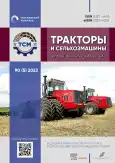Mathematical model of the condensation process in a cylinder of a piston engine
- Authors: Kolunin A.V.1, Lazarev E.S.2, Kaminskiy V.N.1, Korytov M.S.3, Ruzimov A.O.4
-
Affiliations:
- Moscow Polytechnic University
- Omsk State Transport University
- Siberian State Automobile and Highway University
- Ministry of Defense of the Russian Federation
- Issue: Vol 90, No 5 (2023)
- Pages: 395-404
- Section: Environmentally friendly technologies and equipment
- URL: https://journal-vniispk.ru/0321-4443/article/view/249962
- DOI: https://doi.org/10.17816/0321-4443-607362
- ID: 249962
Cite item
Abstract
BACKGROUND: In recent years, there has been a trend of increasing activity towards the development of polar territories. A characteristic feature of the North is negative ambient temperatures that have a negative impact on the condition of piston engines of ground transport, mobile and stationary power plants and labor saving tools. An engine is the least adapted unit for use in such conditions. There is a chain of negative factors that consistently links negative ambient temperatures, in which the equipment is operated, and the condition of the mechanisms and engine systems. The primary link of this chain is condensation processes. The existence of condensation processes during low-temperature operation of the engine has been experimentally proved. The latter takes place when warming up in conditions of negative ambient temperatures. The question «How much water changes the state during the warm-up period?» arises.
AIMS: Development of a mathematical model that makes possible to obtain unbiased information about the activity of condensation processes and to estimate the amount of water that changes the state during the warm-up period.
METHODS: Solving the given tasks is based on classical theories describing operational processes of boilers. The high labor intensity and significant financial costs in organizing such experiments require the search for new research methods. Mathematical models help to solve the task of defining the mass amount of water condensing in a cylinder of a piston engine computationally.
RESULTS: The mathematical model that is characterized by its adaptation to piston engines and is capable of determining the mass amount of water changing the state during the warm-up period iteratively, using the differences in partial pressures and the density of the mass flow of water condensate, has been developed.
CONCLUSIONS: The existence of water has a negative impact on conditions of a piston engine. The information about the amount of water condensing in a cylinder during the warm-up period stimulates to continue studies in the field of motor oils watering, active acids formation and corrosive wear of surfaces of details.
Full Text
##article.viewOnOriginalSite##About the authors
Alexander V. Kolunin
Moscow Polytechnic University
Author for correspondence.
Email: kolunin2003@mail.ru
ORCID iD: 0000-0001-7151-8489
SPIN-code: 7483-9619
Associate Professor of the Power Plants for Transport and Small Energy Department
Russian Federation, 38 Bolshaya Semenovskaya street , 107023 MoscowEvgeniy S. Lazarev
Omsk State Transport University
Email: Incoe@yandex.ru
ORCID iD: 0000-0002-0226-3678
SPIN-code: 7069-0551
Senior Lecturer of the Heat Power and Thermal Engineering Department
Russian Federation, OmskValery N. Kaminskiy
Moscow Polytechnic University
Email: kamr@mail.ru
ORCID iD: 0000-0002-5430-4304
SPIN-code: 8509-5210
Dr. Sci. (Tech.), Professor of the Power Plants for Transport and Small Energy Department
Russian Federation, 38 Bolshaya Semenovskaya street , 107023 MoscowMichael S. Korytov
Siberian State Automobile and Highway University
Email: kms142@mail.ru
ORCID iD: 0000-0002-5104-7568
SPIN-code: 2921-4760
Associate Professor, Dr. Sci. (Tech.), Professor of the Road Transportation Department
Russian Federation, OmskAndrey O. Ruzimov
Ministry of Defense of the Russian Federation
Email: ruzim2009@mail.ru
ORCID iD: 0000-0002-2960-767X
Employee
Russian Federation, MoscowReferences
- Kolunin AV, Gelver SA, Buryan IA. The influence of the Arctic climate on the watering of motor oils in the operating conditions of motor transport. J. Phys.: Conf. Ser. 2019;1260:062012. doi: 10.1088/1742-6596/1260/6/062012
- Kolunin AV, Dudkin VM, Korneev SV. Water pollution and colloidal stability of motor oils. Chem Technol Fuels Oils. 2006;42:273–275. doi: 10.1007/s10553-006-0071-6
- Kolunin A.V., Kaminsky V.N., Kostyukov A.V., et al. Mathematical model of the condensation process in the crankcase space of a piston engine heated at negative temperatures of a cold climate. J. Phys.: Conf. Ser. 2021;1260:112011. doi: 10.1088/1742-6596/1260/11/112011
- Schlichting G. Boundary layer theory. Moscow: Nauka; 1974. (In Russ).
- Isachenko VP. Heat exchange during condensation. Moscow: Energiya; 1977.(In Russ).
- Kolchin AI, Demidov VP. Calculation of automobile and tractor engines. Moscow: Vysshaya shkola; 1980.(In Russ).
- Thermal calculation of boilers (normative method) 3rd ed. Saint Petersburg: NPO CCTI; 1998.(In Russ).
- Grigoriev VA., Zorin VM. Theoretical foundations of heat engineering. Thermal engineering experiment. Guide. 2nd ed. Moscow: Energoatomizdat; 1988. (In Russ).
- AVOK Reference manual. Moscow: LLC IIP AVOK-PRESS; 2014. (In Russ).
Supplementary files











